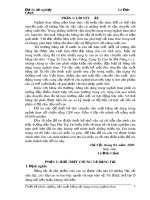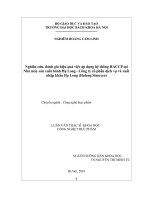- Trang chủ >>
- Thạc sĩ - Cao học >>
- Luật
Ebook Những nội dung cơ bản của Luật đấu thầu: Phần 2
Bạn đang xem bản rút gọn của tài liệu. Xem và tải ngay bản đầy đủ của tài liệu tại đây (13.57 MB, 104 trang )
Part II
THE LAW ON TENDERING
129
Table of conlents
TABLE OF CONTENTS
THE LAW ON TENDERING
C h a p ter I
G E N E R A L P R O V IS IO N S
139
Article 1. Governing scope
139
Article 2. Applicable entities
141
Article 3. Application of the Law on Tendering, related
laws. international treaties and international agreements
141
Article 4. Interpretation of terms
142
Article 5. Iníormation on lendering
150
Article 6. Tendering plans
151
Article 7. Eligibility of tenderers being organizations
153
Article 8. Eligibility of tenderers being individuals
154
A rtid e 9. Requirements applicable to a party calling
for tenders and to an expert tenđering group
154
Article 10. Conditions for participation in tenđering
for any one tender package
156
131
KEY ISSUES IN THE LAW ON TENDERING
Article 11. Ensuring competitiveness in tendering
157
Article 12. Prohibited conducts in tendering
159
Article 13. International tendehng
163
Article 14. Preíerential treatment in international
tendering
164
Artìcle 15. Currency to be used in tendering
165
Article 16. Language to be used in tendering
165
Artỉcle 17. Expenses for tendering
166
C h a p ter I I
S E L E C T IO N 0 F C O N T R A C T O R S
166
Section 1
FORMS 0F SELECTION 0F CONTRACTORS
166
Article 18. open tendering
166
Article 19. Limited tendering
167
Article 20. Direct appointment of contractor
168
Article 21. Direct procurement
170
Article 2Z OxTipetitive quotation in procxirement of goods
171
Article 23. SelMmplementation
172
Article 24. Selection of contractor in specia! cases
172
132
Table of contents
Section 2
GENERAL PROVISIONS ON TENDERING
173
Article 25. Conditions for issuance of tender invitation documents
173
Artỉcle 26. Methods of tendering
173
Article 27. Tenđer guarantee
175
Article 28. Principles for assessment of tenders
177
Article 29. Method of assessment of tenders
178
Article 30. Tendering Via the Internet
180
Article 31. Regulations on time-limíts applicable
during tendering
181
Section 3
SEQUENCE FOR IMPLEMENTATION
0F TENDERING
183
Article 32. Preparation for tendering
183
Artìcle 33. Organization of tendering
186
Artícle 34. Claritication of tender invitation documents
187
Article 35. Sequence of assessment of tenders
188
Article 36. Clariíìcation of tenders
189
Artícle 37. Consideration for recommendation as the
133
KEY ISSUES IN THE LAW ON TENDERING
vvinning tenderer in the case of tendering for provision of
consultancy services
190
Article 38. Consideration for recommendation as the
vvinning tenderer in the case of tendering for procurement
of goods, for construction and Installation. and for EPC
190
Artícle 39. Submission for approval and evaluation
of the results of tendering
191
Articte 40. Approval of the results of tendering
192
Articte 41. Notification of the results of tendering
193
Artícte 42. Negotiation, finalization and signing of
the contract
193
Section 4
CANCELƯVTION 0F TENDERING
AND REJECTION 0F TENDERS
194
Artícle 43. Cancellation of tendering
194
Article 44. Pinandal liabilíties when tendering is cancelled
195
Artícle 45. Rejection of tenders
196
C h a p te r III
CONTRACTS
Artícte 46. Pnnciples for íormulatíon of contracts
134
197
197
Table of contents
Article 47. Contents of contracts
197
Article 48. Forms of contract
198
Artícle 49. Lump-sum contract
198
Article 50. Form of unit price contract
199
Artỉcle 51. Form of time based contract
199
Article 52. Form of percentage based contract
200
Artỉcle 53. Multiple contractual forms within the one
200
contract
Article 54. Signing of contract
201
Article 55. Contracỉ pertormance guarantee
201
Article 56. VVarranty
202
Artỉcle 57. Adjustment to contracts
203
Article 58. Contract payment
205
Article 59. Supervision of implementation of contract.
check and acceptance of, and liquidation of the contract
205
C h a p ter IV
RIGHTS AND OBLIGATIONS
OF PARTIES IN TENDERING
Article 60. Responsibilities of the authorized person
207
207
135
KEY ISSUES IN THE ư^w ON TENDERING
Article 61. Rights and obligations of Investors
208
Article 62. Rights and obligations of parties calling
for tenders
209
Article 63. Rights and obligations of expert tendering groups
210
Article 64. Rights and obligations of tenderers
211
Article 65. Rights and obligations of evaluating bodies or organi2 ations
212
C h a p ter V
ADMINISTRATION
0 F T E N D E R IN G A C T IV IT IE S
Article 66. Contents of State administration of tendering
213
213
Article 67. Responsibílities and powers of the
Government and of the Prime Minister of the Government
214
Article 68. Responsibỉlities and povvers of the Mỉnistry
of Planning and Investment
215
Article 69. Responsibilities and powers of ministríes.
ministerỉal equívalent bodỉes, and all level peopJe's
committees
Article 70. Dealing with situations in tendering
136
216
217
Table of contents
Article 71. Tendering Inspectorate
219
Article 72. Resolution of protests regarding tendering
219
Article 73. Procedures for resolution of protests
regarding tendering
220
Article 74. Complaints and denunciations about
tendering
224
Artícle 75. Dealing with breaches of the laws on
tendering
224
C h a p t e r VI
IMPLEMENTING P R O V IS IO N S
225
Article 76. Implementation guidances
225
Artỉcle 77. Implementation effects
226
137
Part II. The Law on Tenderlng
NAÌKỈNAL ASSEMBLY
No. e i-2 0 0 5 -Q H ll
SOCIALIST REPUBLIC OF VIETNAM
Independence - Preedom - Happiness
NATIONALASSEMBLY 0 F THE SOOALIST REPUBLIC
OF VIETNAM LEGISLATURE XI, SESSION 8
(from ĨH October until 29 November 2005)
LAW ON T E N D E R IN G
Pursuant to the ĩ 992 Coníĩtítutíon o f the Socialist
Republic o f Vietnani as am ended an d supplemented
'^by Resolution 5Ĩ-200Ĩ'QHW p assed by Legisỉature
X o f the National Assenihĩỵ at íts lOth Session on 25
December 2001;
This Law reguỉates tendering.
C h a p ter I
G E N E R A L P R O V IS IO N S
A rticle 1. G overn in g sc o p e
This Law regulates tendering activities in order to
select contractors for provision of consultancy
services, for procurement of goods, and for construction and installation for tender packages belonging to the
139
KEY ISSUES IN THE LAW ON TENDERING
following projects:
1. Investment and development projects financed by
the State as to thirty (30) per cent or more, comprising:
(a)
New construction and investment projects,
and upgrading and expansion of construction projects
in which investment has already been made;
(l>) Investment projects for procurement of assets
including equipment and machinery not required to
be installed;
(c) Projects for planning for regional development,
planning for industry development, and planning for
construction of urban and ruraỉ areas;
(d) Projects for scientifìc research, for development of technologv’, and for technical assistance;
(dd) Other projects for purposes of investment and
development.
2. Projects financed by the State for procurement
of assets for the purpose of maintairúng regular activities
of State bodies, political organizations, socio-political
organizations, socio-political-occùpationai organizations, social organizations, socio-occupational organizations and units of the armed íorces.
3. Projects financed by the State for procurement
140
Part II. The Law on Tendering
of assets for the purpose of renovation or major
repairs to equipment, production lines, building
vvorks and factories of State owned enterprises in
which investment has already been made.
A r t i c le 2. A p p lic a b le en tỉties
1. Domestic and íoreign organizations and individuals participating in tendering activities for tender packages belonging to the projects stipulated in
Article 1 of this Law.
2. Organizations and individuals involved in ten-
dering activities for tender packages belonging to the
projects stipulated in Articlp 1 of this I^aw
3. Organizations and individuals with projects not
within the governing scope of this Law may choose to
apply this Law.
A rticle 3. A p p lication o f th e L aw on Tenderingy
related lawSy ỉntern atỉo na l treatỉes a n d ỉnternatỉonal agreem ents
1. Tendering activities must comply vvith the provisions of this Law and other related laws.
2.
If
th e re
are
any
sp e cia l
m a tte rs
on
te n d e rin g
stipulated in other lavvs, then those such laws shall apply.
3. Tendering for projects using official development
141
KEY ISSUES IN THE LAW ON TENDERING
aid (abbreviated as ODA) shall be implemented on
the basis of provisions in international treaties of
which the Socialist Republic of Vietnam IS a member
or international agreements signed by authorized
bodies or organizations on behair of the Socialist
Republic of Vietnam.
A rticle 4, In te r p r e ta tio n o f term s
In this Law, the following terms shall be construed as follows:
1. Pinanced by the State means the use of State
Budget funds, credit íacilities guaranteed by the
State, credit facilities for investment and development of the State, investment and development
funds of State owned enterprises, and other Capital
funds managed by the State.
2. Tendering means the process of selecting a contractor who satisĩies the requirements set by the party
calling for tenders in order to implement a tender
package belonging to a project stipulated in Article 1
of this Law, on the basis of ensuring competitiveness,
ĩairness, transparenry and economic efficiency.
3. Tendering activities means activities of the parties involved in the process of selecting a contractor.
142
Part II. The Law on Tendering
4. Sequence for im pỉem entation o f tendering
means the steps being preparation for tendering;
organization of tendering; assessment of tenders;
evaluation and approval of the results of tendering;
notification of the results of tendering; and negotiation, fmalization and signing of a contract.
5. Domestic tendering means the process of selection of a contractor who satisfies the requirements of
the party calling for tenders, in which domestic tenderers participate.
6. Internationaỉ tenderỉng means the process of
selection of a contractor who satisfies the requirements of the party calling for tenders, in vvhich both
foreign and domestic tenderers participate.
7. Prqịect means a set of proposals for implementing
a part or the whole of works aimed at achieving an
objective or a requirement within a specified period
of tiine and based on a specified fmancing source.
8. Aưthorized person means the person with the
right pursuant to laws to make project decisions. In
the case of projects financed by the State as to thirty
(30) per cent or more, excluding projects Tinanced by
the State as to One hundred (100) per cent, the authorized
person is the Board of Management or authorized
143
KEY ISSUES IN THE LAW ON TENDERING
representative of the Capital contributing parties.
9. Inuestor means the entity ovvning the financing
Capital or the entitv assigned responsibility to repre-
sent such ovvner, or the borroNver directly managing
and implementing any project as defined in clause 7
of this Article.
10. Party caỉling for tenders means the investor or
a professional organization with sufficient capabilitv
and experience in accordance with the laws on tendering for the investor to hire in order to hold tendering.
11.Tenderer means any eligible organization or
individual as stipulated in Articles 7 and 8 of this Law.
12.
H ead contractor means a tenderer liable for its
participation in tendering which gives its name to a
tender, and which signs and implements a contract if
selected (hereinafter referred to as a participating
tenderer). A tenderer participating in tendering independently is referred to as an independent tenderer.
A tenderer participating in tendering jointly with one
or more other tenderers to submit one tender is
referred to as a partnershỉp tenderer.
13. Consultancy tenderer means a tenderer participating in tendering for the supply of pnxlucts, who satisfies
144
Part II. The Law on Tendering
the requirements on knovvledge and professional experience stipulated in clause 34 of this Article.
14. Supply tenderer means a tenderer participating
in tendering for tender packages for the supply of
goods as deĩmed in clause 35 of this Article.
15. Construction tenderer means a tenderer participating in tendering for tender packages for construction and installation as defined in clause 36 of
this Article.
16. EPC tenderer means a tenderer participating
in tendering for the performance of an EPC tender
package as deíĩned in clause 21 of this Article.
17. Suh-contractor means a contractor performing
part of the work of a tender package on the basis of
an agreement or contract signed with the head contractor. A sub-contractor is not a contractor liable for
participation in tendering.
18. Domestic tenderer means any tenderer estab-
lished and operating pursuant to the laws of Vietnam.
19. Foreign tenderer means any tenderer established and operating pursuant to the laws of the
country of nationality of such tenderer.
20. Tender package means a part of a project, and
145
KEY ISSUES IN THE ưvw ON TENDERING
in a number of special cases means the entire project;
a tender package may comprise items for the procurement of similar goods for a number of proj€?ct5 or a
one*off procurement in regular procurement of goods.
21. EPC tender package means a tender package
which comprises the entire work of design, supply of
equipment and materials, and construction and
installation.
22. Pre-quaỉí/ĩcation invitation documents means
all of the documents stipulating the requirements on
capability and experience of tenderers as the legal
basis for the party calling for tenders to select a list
of tenderers to be invited to submit tenders.
23. Pre-quaỉifĩcation application means all of the
documents prepared by a tenderer in accordance with
the requirements of the pre-qualification invitation
documents.
24. Tender invitation documents means all of the
documents used for open or limited tendering stipulating the requirements for any one tender package
and providing the legal basis for tenderers to prepare
their tenders and for the party calling for tenders to
assess tenders aimed at selection of a winning ten146
Part II. The Law on Tendering
derer; and also providing the basis for negotiation,
finalization and signing of a contract.
25. Tender m eans all of the documents prepared
by a tenderer in accordance with the requirements of
the tender invitation documents and submitted to
the party calling íor tenders in accordance with the
provisions in the tender invitation documents.
26. Tender package price means the value of a tender package specified in the tendering plan based on
the approved total invested Capital, total estimated
budget or estimated budget and current regulations.
27. Tender price meaiis the pricti slated by a teii-
derer in its tender. If a tenderer provides a discount
letter, then the tender price is the price after deducting
the discount.
28. Proposed contrací sum means the sum proposed
by the party calling for tenders on the basis of the
tender price of the tenderer selected to be avvarded the
cx)ntract after errors have been rectified and discrepancies
have been adjusted as required by the tender
invitation documents.
29. v/inning tender price means the price approved
from the results of selection of contractor as the basis
147
KEY ISSUES IN THE LAW ON TẼNDERING
for negotiation, finalization and signing of a contract.
30. E qual [ootiĩig price means the tender price
submitted by a tenderer to implement a tender package
after errors have been rectiĩied and discrepancies
have been adjusted, and after adding all necessary
operating and maintenance costs and other costs
relating to the schedule, quality and origin of goods
or construction works under the tender package for
the entire use life. Equal footing prices shall be used
to compare and rank tenders and are referred to as
the assessment prices.
31. Contract means the document signed between
the investor and the selected contractor based on the
agreement reached betvveen the parties. The contract
must be in accordance with the decision approving
the results of selection of contractor.
32. Tender guarantee means that the tenderer
provides security by one of the methods of paying a
deposit, providing collateral or providing a letter of
guarantee for a defmite term as stipulated in the tender invitation documents, in order to secure the liability of the tenderer for its tender.
33. Contract perform ance guarantee means that
the tenderer provides security by one of the security
148
Part II. The Law on Tendering
methods of paying a deposit, providing collateral or
providing a letter of guarantee for a definite term as
stipulated in the tender invitation documents, in
order to secure the liability of the winning tenderer
to perform the contract.
34. Consultancy services comprise:
(a) Consultancy services on project preparation
comprising ĩormulation and assessment of planning
reports, charts on overall development, architecture,
pre-feasibility and íeasibility study reports;
(b) Consultancy services on project implementation
comprising surveyirig, deaigii, total estimated budgets
and estimated budgets, preparation of tender invitation
documents, assessment of tenders, and supervision of
execution of building and installation of equipment;
(c) Consultancy services on project management,
arranging íinance, training, technology transíer and
other consultancy services.
35. Goods means machinery, equipment, raw
materials, fuel, supplies, consumer goods, and services
other than conKultancv services.
36. Construction an d instaỉỉation comprises work
which is part of the process of building and installing
149
KEY ISSUES IN THE ư^w ON TENOERING
equipment in construction works and items of vvorks,
and of renovation and major repairs.
37. Protest regardỉng tendering means a request
from any tenderer participating in tendering for
reconsideration of the results of selection of contractor or of any other relevant matter during the tendering
process when such tenderer considers that his rights
and interests have been adversely affected.
38. National tendering netivork means the system
applying iníormation technology set up and managed
by the State administrative body for tendering in
order to uniformly administer information about tendering and to Service tendering activities.
39. Tendering evaluation means check and assessment by the body or organization in charge of the
evaluation of tendering plans, tender invitation
documents and results of selection of contractor as
the basis for the authorized person to consider and
make a decision in accordance with this Law. An
evaluation of the results of selection of contractor is
not a re-assessment of tenders.
A rticle 5. Inform atỉon on ten d erỉn g
1. The following information on tendering must
150
Part II. The Law on Tenderlng
be published in the tendering newsletter and on the
tendering website of the State administrative body
for tcndering:
(a)Tendering plans;
(b) Notices inviting pre-qualification applications;
results of pre-qualification;
(c) Invitations to tender in the case of open tendeiing;
(d) lists of tenderers invited to participate in tendering;
(dd) Results of selection of contractor;
(e) Iníormation on how breaches of the law on
tendering have been dealt with;
(g) Current legal Instruments on tendering;
(h) Other relevant information.
2.
After the information stipulated in clause 1 of
this Article has been published in the tendering
newsletter and on thé tendering website, it may also
be published on other mass media in order to facilitate
access by interested organizations and individuals.
The Government shall provide detailed regulations on iníormation on tendering.
A rtícle 6. T en d erỉn g p la n s
1. The authorized person must provide vvritten
151
KEY ISSUES IN THE LA\N ON TENDERING
approval of a tendering plan after approval of the
investment decision, or the tendering plan may be
approved at the same time as the investment decision in cases where there are adequate conditions
providing a legal basis for the investor to hold selection of a contractor, except for tender packages which
must be implemented prior to an investment decision. The person approving a tendering plan shall be
liable beíore the laws for his decision.
2. A tendering plan must be íormulated for the
entire project; in cases where there are inadequate
conditions to íormulate a tendering plan for the
entire project, it shall be permitted to formulate a
tendering plan for some tender packages to be implemented in advance, but only when essential.
3. A tendering plan must set out clearly the num*
ber of tender packages and the contents of each tender package. The contents of each tender package
shall comprise:
(a) Name of the tender package;
(b) Tender package price;
(c) Financing source;
(d) Form of selection of contractor; method of tendering;
152
Part II. The Law on Tendering
(dd) Scheduled time for selection of contractor;
(e) Form of contract;
(g) Scheduled period for perĩormance of the contract.
4.
Division of the project into different tender packages
shall be based on the technical nature of the project
and the sequence for its implementation, ensuring
unity vvithin the project and that each tender package
is of an appropriate size. There shall be only One set of
tender invitation documents for any one tender package,
and tendering shall only be held once. Each tender
package shall be implemented by only one contract,
except where a tender package is made up of several
independent components in which case it may be
implemented by one or more than one contract.
A rticle 7. E lig ib ility
organizations
o f te n d e re rs
b ein g
A tenderer being an organization shall be deemed to
bo eligible vvhen it satisfies the following conditions:
1.
It has a business registration certiíìcate or
investment certiTicate issued pursuant to laws, or a
decision on establishment in the case of a domestic
tenderer vvhich is an organization without business
registration. A foreign tenderer must have registra*
153









